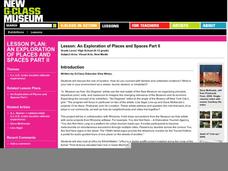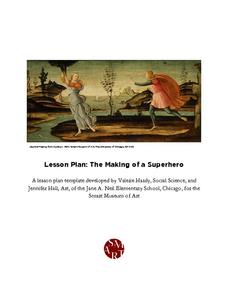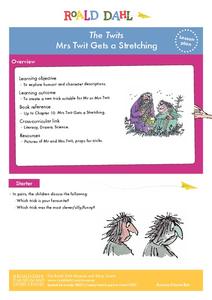Curated OER
Out of the Box: From Myth to Art
Pupils position thier bodies in the same position as sculptures they see. They discuss why the sculpture chose that position. They design fountains for a public area using the myth of Pandora's Box.
Curated OER
Writing About Photographs: Responding to the Art of Dorothea Lange
Students view and discuss photographs by Dorothea Lange. They describe what they see, pose questions about the images, reflect on their personal responses, and create diaries written in the voices of individuals depicted in the images.
Curated OER
The Art of Romare Bearden
Students examine the works of artist Romare Bearden. In an online activity, they scrutinize his work, "Tomorrow I May Be Far Away." by moving the mouse over it. Students also compose poems inspired by one of Bearden's works.
Roald Dahl
Matilda - Miss Honey and The Trunchbull
As the instructor reads aloud several quotes from five chapters of the story Matilda, class members mime their interpretation of the scenes. Then, after reading "Miss Honey" and "The Trenchbull" (chapters seven and eight), the...
Roald Dahl
Matilda - The Third Miracle
Magnus takes a visit to the classroom in the 20th chapter of Matilda. Or does he? After reading, learners interview the person in the hot seat to get a detailed account of what happened during this chapter. Then, they write individual...
Roald Dahl
Matilda - The New Home
Matilda finally gets her happy ending with a new home with Miss Honey. But first, Mr. Wormwood goes on trial for his wrong doings and bad car sales. Class members take on the role of a character in the trial and participate in a role...
New Class Museum
Lesson: An Exploration of Places and Spaces Part II
How does your location alter or impede your movement? An interesting question posed by two artists, who work to show the restrictions of people in various landscapes. Learners analyze both exhibitions, discuss location and movement, then...
Smart Museum of Art
The Making of a Superhero
Thor, Loki, Iron Man, and Captain America. As part of their study of Greek and Roman gods and heroes, middle schoolers compare the characters in The Avengers to Greek counterparts. Individuals then create their own superhero,...
Roald Dahl
Matilda - Arithmetic
Mr. Wormwood, one of the characters in Roald Dahl's Matilda, is not the most trustworthy of characters. Have student groups take on the roles of car salespeople and play a game to see who can make the most profit by selling...
Roald Dahl
Matilda - Throwing the Hammer
Full truth, or an exaggeration? How can you tell when a storyteller is exaggerating a story? Readers analyze a story told by Hortensia, and identify the exaggerative language she uses. Then, learners write their own narrative story using...
Roald Dahl
Matilda - The Reader of Books
The titular Matilda from Roald Dahl's famous novel adored books above all things. Discuss why it is important to read stories from across cultures and around the world using the first chapter from the ever-loved story Matilda.
Roald Dahl
The Twits - Dirty Beards
The problem with beards is that they collect a lot of food. The first lesson in an 11-part unit related to The Twits by Roald Dahl explores the hairy jungle that is Mr. Twit's beard. A concluding project has learners create their own...
Roald Dahl
Matilda - The Ghost
How do you think the parrot in "The Ghost" chapter of Matilda feels in the chimney? Put a class member in the hot seat and have the class ask questions relating to how they might have felt if they were the parrot in the chimney....
Curated OER
Picturing History: John Singleton Copley and British Portraiture
Students observe and compare 18th century British portraits with those made by John Singleton Copley. By conducting research they explore the cultural climate of the portraits in order to write a historically accurate story.
Roald Dahl
Matilda - The Platinum-Blond Man
Before reading Chapter Six, "The Platinum-Blond Man" in Matilda, readers preview the illustration of Mrs. Wormwood dropping her plate of food, and think about what may have happened to cause the scene. After reading the chapter, class...
Roald Dahl
Matilda - The Weekly Test
Readers take the main characters in Matilda and individually describe them through a mnemonic. To get there, group members create an acrostic poem describing the character they were given, and choose one of the words from the...
Roald Dahl
Matilda - Miss Trunchbull
How would you react to the Trunchbull if she was your teacher? This is the focus of an activity that has readers imagining and then acting out their reactions to various Trunchball scenarios in the story.
Roald Dahl
Matilda - The First Miracle
As the story unfolds, readers discover Matilda has a superpower. Take part in an activity that has learners talking about what superpower they would have, how they would use it, and how it could help others. Then, after reading the...
Roald Dahl
Matilda - Bruce Bogtrotter and the Cake
After reading the 11th chapter in Matilda, class members take on the role of Bruce Bogtrotter and re-enact the cake eating scene. Here's the catch: they must come-up with an impromptu re-enactment of the scene from the story, and...
Roald Dahl
The Twits - The House, the Tree and the Monkey Cage
A house with no windows and a garden full of stinging nettles make the perfect home for Mr. and Mrs. Twit. The seventh lesson in an 11-part unit designed to accompany The Twits by Roald Dahl takes a closer look at the Twits' home...
Roald Dahl
The Twits - Muggle-Wump Has an Idea
If a bar of chocolate was on the floor, would you try to pick it up? What if it was covered with glue? The eighth lesson in an 11-part unit designed to accompany The Twits by Roald Dahl has scholars imagine crazy scenarios. The...
Roald Dahl
The Twits - Mrs Twit Gets a Stretching
A cork, a rubber snake, and a bucket of mud may not seem like the best materials for washing a car, but they are in The Twits. The fifth lesson in an 11-part unit designed to accompany The Twits by Roald Dahl has readers role play...
Roald Dahl
The Twits - Mrs Twit
"A person who has good thoughts cannot ever be ugly." The second instructional activity in an 11-part unit that accompanies The Twits by Roald Dahl uses poetry to encourage positive character traits. Mrs. Twit has ugly...
Roald Dahl
The Twits - The Wormy Spaghetti
What do spiders' legs and an octopus's eyeball have to do with metaphors? The fourth lesson in an 11-part unit designed to accompany The Twits by Roald Dahl uses disgusting foods to teach about metaphoric writing.
Other popular searches
- European Art Museums
- Visiting Art Museums
- Art Museums and Education
- Philanthropy and Art Museums
- Trip to Art Museums
- Art Museum's Ahambra Vase
- Renaissance Art Museums
- Art Museum's Alhambra Vase























